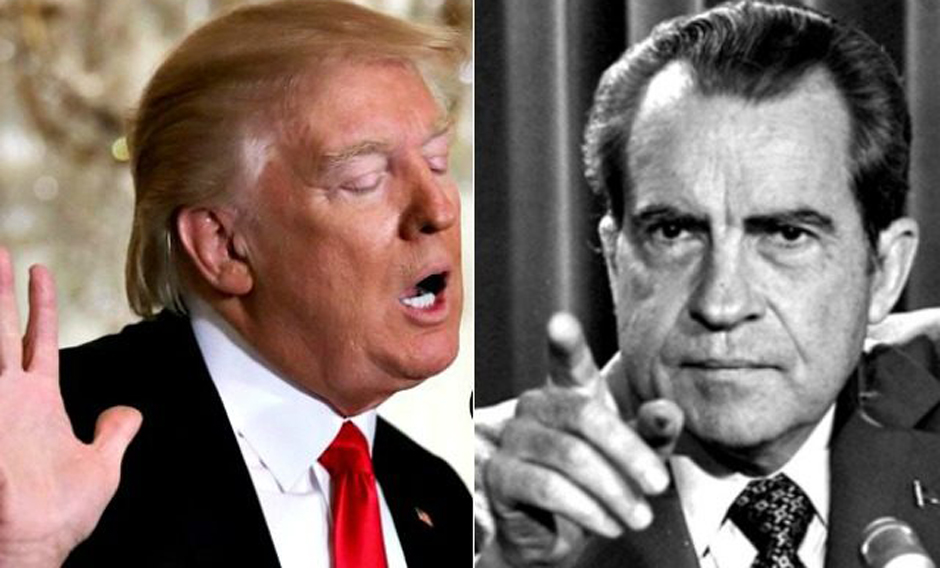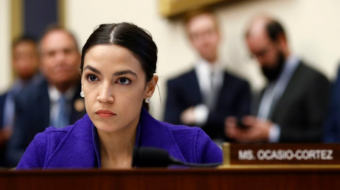
WASHINGTON—In yet another head-spinning development in the continuing probe of GOP President Donald Trump’s campaign and Russian interference on his behalf in the 2016 election, Trump is now tweeting he can pardon himself, but won’t because – he says – he’s done nothing wrong.
There’s just one slight problem with that latest Trump tweet, some legal experts point out. We’re talking about obstruction of justice here, not just the interference in the election itself.
And obstruction of justice, in circumstances that sound eerily like what Trump has done by firing former FBI Director James Comey, threatening to fire Special Counsel Robert Mueller and claiming he can control the investigation, is exactly what the House Judiciary Committee decided Richard Nixon did in its Watergate articles of impeachment 44 years ago.
And you can’t use the pardon power in impeachment cases, the U.S. Constitution says.
“As has been stated by numerous legal scholars, I have the absolute right to PARDON myself, but why would I do that when I have done nothing wrong?” Trump tweeted. “In the meantime, the never-ending Witch Hunt, led by 13 very Angry and Conflicted Democrats (& others) continues into the mid-terms!”
“The appointment of the Special Councel [sic] is totally UNCONSTITUTIONAL! Despite that, we play the game because I, unlike the Democrats, have done nothing wrong!” he added in a following tweet. He later used a third tweet to fix his spelling.
Trump’s lead lawyer now, former Republican U.S. Attorney and New York City Mayor Rudy Giuliani, sang the same tune on the Sunday talk shows. So did Trump’s legal team, to Mueller, in a Jan. 29 letter the New York Times obtained and published.
Giuliani told ABC’s This Week Trump “probably does” have the pardoning power for himself. “He has no intention of” using it that way, Giuliani added.
“I think the political ramifications of that would be tough. Pardoning other people is one thing. Pardoning yourself is another,” Giuliani admitted.
Trump just pardoned right-wing author, speaker and propagandist Dinesh D’Souza, convicted of illegal campaign contributions. He previously pardoned notoriously racist former Phoenix Sheriff Joe Arpaio, convicted of contempt of court for racial profiling of anyone with a brown skin.
And sentence commutations are part of the president’s pardoning power, too. So Trump’s considering commuting the 14-year sentence of former Democratic Illinois Gov. Rod Blagojevich to “time served” for soliciting cash in exchange for appointment to a then-vacant U.S. Senate seat.
Legal scholars split, along partisan lines, on whether Trump could pardon himself. Republicans said “yes,” the others said “no.”
A typical “yes” comment came from John Yoo, a former top Justice Department official in the George Bush administration, who now teaches law at the University of California at Berkeley. “President Trump can clearly pardon anyone — even himself — subject to the Mueller investigation,” Yoo told the Times.
Harvard constitutional law professor Laurence Tribe was among the “no’s.” “No, Trump can’t pardon himself. The Constitution tells us so,” Tribe told the Washington Post. The one Republican – or former Republican – joining Tribe in that op-ed is Richard Painter, a former ethics lawyer for George W. Bush, who’s now a University of Minnesota law professor and seeking the Democratic nomination for the U.S. Senate there.
Which brings up the Constitution…and Watergate.
Article II, Section 2 of the Constitution, which defines presidential powers, says the president “shall have the power to grant reprieves and pardons for offenses against the United States, except in cases of impeachment.”
A bipartisan majority of the House Judiciary Committee relied on that in 1974 to approve the first article of impeachment against Nixon, for obstruction of justice, 27-11.
Nixon, that article said, “in violation of his constitutional duty to take care that the laws be faithfully executed, has prevented, obstructed and impeded the administration of justice” by “engaging in a course of conduct” – the cover-up – to conceal the Watergate break-in, protect the responsible people “and conceal the existence of other covert activities.”
And key points in Nixon’s cover-up, the impeachment article said, included – but weren’t limited to — his own lying to investigators, withholding evidence, and “interfering or endeavoring to interfere with investigations by the Department of Justice, the Federal Bureau of Investigation, the Office of Watergate Special Prosecution Force and congressional committees.”
Which sounds very much like what Trump has been doing. Top congressional Democrats started saying so after Trump fired Comey earlier this year.
Sen. Patrick Leahy, D-Vt., who was elected just after Watergate and Nixon’s resignation, said then “This is nothing less than Nixonian.” “It certainly is ‘Nixonian’ in tone to fire someone of this stature in the midst of an investigation,” added Sen. Richard Blumenthal, D-Conn., a former state attorney general. And Sen. Ed Markey, D-Mass., also elected to the House in 1974 tweeted then that Comey’s firing was “disturbingly reminiscent of the Saturday Night Massacre during the Watergate scandal and the national turmoil that it caused.”
Stay tuned. The Trump-Russia merry-go-round, with pardons as an added element, is still spinning.












Comments